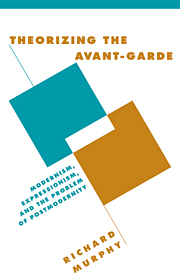Book contents
- Frontmatter
- Contents
- 1 Theories of the avant-garde
- 2 Re-writing the discursive world: revolution and the expressionist avant-garde
- 3 Counter-discourses of the avant-garde: Jameson, Bakhtin and the problem of realism
- 4 The poetics of hysteria: expressionist drama and the melodramatic imagination
- 5 Kafka's photograph of the imaginary. Dialogical interplay between realism and the fantastic. (The Metamorphosis)
- 6 Weimar silent film and expressionism: representational instability and oppositional discourse in The Cabinet of Dr. Caligari
- 7 Conclusion. Postmodernism and the avant-garde
- Bibliography
- Index
4 - The poetics of hysteria: expressionist drama and the melodramatic imagination
Published online by Cambridge University Press: 22 September 2009
- Frontmatter
- Contents
- 1 Theories of the avant-garde
- 2 Re-writing the discursive world: revolution and the expressionist avant-garde
- 3 Counter-discourses of the avant-garde: Jameson, Bakhtin and the problem of realism
- 4 The poetics of hysteria: expressionist drama and the melodramatic imagination
- 5 Kafka's photograph of the imaginary. Dialogical interplay between realism and the fantastic. (The Metamorphosis)
- 6 Weimar silent film and expressionism: representational instability and oppositional discourse in The Cabinet of Dr. Caligari
- 7 Conclusion. Postmodernism and the avant-garde
- Bibliography
- Index
Summary
…one should not ask about the quality of this art, but about its intensity. The intensity is what constitutes its value. For it is not a matter of artistic accomplishment, but of the will … This art will blow apart the aesthetic …”
Kurt PinthusMelodrama as counter-discourse
Kafka's reported reaction on first reading a volume of poetry by a particularly strident expressionist writer – “It is screaming. That is all” – has frequently been taken more broadly as expressing his general attitude of skepticism towards the expressionist movement as a whole. Brief as it is, Kafka's response nevertheless constitutes a troubling criticism, pointing to an inherent danger within expressionism where the seemingly liberating impulse towards expression turns into mere excess, into an hysterical “sound and fury” which exhausts itself at the level of its extravagant and desperate gestures and fails to carry any further meaning with it.
In this chapter however I would like to propose that it is precisely this hysterical aspect of expressionism which aligns it with another literary mode, namely melodrama, whose method is similarly excessive, yet whose deeper significance lies in the fact that it resorts to such “screaming” only in order to reach beyond dominant representational systems, codes and conventions, and beyond the epistemological and discursive restrictions associated with them.
- Type
- Chapter
- Information
- Theorizing the Avant-GardeModernism, Expressionism, and the Problem of Postmodernity, pp. 142 - 179Publisher: Cambridge University PressPrint publication year: 1999



